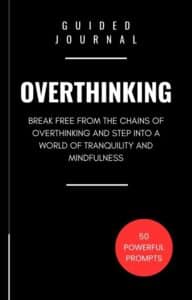In a world consumed by constant distractions, overthinking has become an unwelcome companion for many. Our minds race with a ceaseless torrent of worries, doubts, and what-ifs, leaving us exhausted and disconnected from our inner peace.
But amidst the chaos, there is a beacon of hope—a journal. Within the pages of a journal lies a sanctuary, a place where we can pour out our thoughts and unravel the intricate web of overthinking that binds us.
Welcome to a transformative journey of self-discovery and introspection. In this article, we present to you 50 deep journal prompts that will guide you towards conquering overthinking and finding inner peace. These prompts are not merely ink on paper; they are gateways to understanding, healing, and growth. They will help you navigate the labyrinth of your thoughts, unearth hidden emotions, and cultivate a sense of tranquility within.
So, grab a pen and an empty journal, for within these pages lies the key to unlocking a profound connection with yourself. Let us embark on this voyage together, as we delve into the depths of our souls, shedding light on the shadows that hinder our pursuit of inner peace.
Overthinking: Understanding the Maze of the Mind
Welcome to an exploration of the intricate labyrinth of overthinking. In this chapter, we will embark on a journey to unravel the mysteries of this common yet often misunderstood mental phenomenon. Overthinking affects many individuals and can have a profound impact on our well-being, relationships, and decision-making. By comprehending its nature, causes, and consequences, we can develop strategies to tame the overactive mind and find greater peace and clarity.
Defining Overthinking
At its core, overthinking refers to the excessive and repetitive contemplation of a situation, problem, or event. It involves dwelling on the past, worrying about the future, and analyzing every detail to the point of exhaustion. Overthinkers tend to ruminate, constantly replaying scenarios and hypothetical outcomes in their minds. This constant mental churn often leads to anxiety, stress, and a sense of being trapped in an endless loop of thoughts.
Understanding the Causes
Perfectionism: Overthinking is often fueled by a desire for perfection and an intense fear of making mistakes. The overthinker may constantly second-guess themselves, striving for an unattainable standard of flawlessness.
Example: Sarah, a talented artist, spends hours agonizing over every brushstroke, convinced that her work will never be good enough. She constantly doubts her abilities, leading to frustration and a diminished sense of self-worth.
Fear of the Unknown: Overthinkers frequently struggle with uncertainty and the fear of the unknown. They seek to control every aspect of their lives and analyze every possible outcome to avoid potential pitfalls.
Example: John, a recent college graduate, spends countless nights anxiously weighing the pros and cons of different career paths. His fear of making the wrong choice paralyzes him, preventing him from taking action and moving forward.
The Consequences of Overthinking
Mental and Emotional Exhaustion: Overthinking taxes the mind, draining mental energy and leaving individuals feeling fatigued and overwhelmed. This constant mental chatter can lead to insomnia, difficulty concentrating, and increased stress levels.
Strained Relationships: Overthinking can negatively impact relationships, as it often leads to doubt, suspicion, and overanalyzing interactions. The constant need for reassurance and validation can put a strain on friendships, romantic partnerships, and professional collaborations.
Example: Lisa, an overthinker, constantly questions her partner’s feelings for her, dissecting every word and gesture for hidden meanings. This constant doubt erodes trust and creates tension in their relationship.
Strategies to Overcome Overthinking
Mindfulness and Self-Awareness: Cultivating mindfulness helps to bring attention to the present moment and detach from the endless stream of thoughts. Self-awareness enables individuals to recognize when they are caught in the cycle of overthinking and consciously redirect their focus.
Challenging Negative Thoughts: Overthinkers often engage in negative self-talk and catastrophic thinking. By questioning and challenging these thoughts, individuals can gain perspective and reframe their mindset in a more positive and realistic light.
Setting Boundaries: Establishing boundaries with one’s thoughts is crucial. Allocating specific time for reflection and problem-solving while intentionally setting aside worries during other periods can help prevent overthinking from consuming every waking moment.
Embracing a Balanced Mindset
While it may be impossible to completely eliminate overthinking, it is essential to find a balance between reflection and action. By accepting that uncertainty is a natural part of life and embracing imperfection, individuals can cultivate a more resilient mindset and free themselves from the grip of overthinking.
Embrace the present moment, trust your instincts, and remember that sometimes the most profound insights come when we allow ourselves to simply be.

The Transformative Power of Journaling: Overcome Overthinking and Unleash Your Potential
Welcome to the world of journaling, a powerful tool that can help you break free from the chains of overthinking and unlock your true potential. In this chapter, we will explore the definition of journaling and delve into its transformative benefits specifically for overthinking.
Get ready to embark on a journey of self-discovery, self-reflection, and personal growth.
Understanding Journaling
Journaling is the practice of putting pen to paper (or fingers to keyboard) to record your thoughts, feelings, and experiences in a structured manner. It goes beyond simply recounting your day; it is a process of self-expression, introspection, and self-awareness. By creating a safe space to explore your innermost thoughts, journaling becomes a powerful tool for personal growth.
The Overthinking Trap
Overthinking can be an all-consuming and exhausting habit that holds you back from living a fulfilling life. It involves dwelling on negative thoughts, replaying scenarios in your mind, and getting trapped in a cycle of worry and self-doubt. Overthinking can lead to anxiety, stress, and even impede decision-making abilities. But fear not, journaling can be your key to breaking free from this vicious cycle.
Decluttering the Mind
Journaling provides a safe outlet for your thoughts, allowing you to declutter your mind and make sense of your emotions. By putting your thoughts on paper, you distance yourself from them and gain a fresh perspective. This process helps you identify recurring patterns, triggers, and irrational beliefs that fuel your overthinking, empowering you to challenge and ultimately overcome them.
Emotional Release and Self-Reflection
As you pour your thoughts onto the pages of your journal, you release the emotional weight that can often accompany overthinking. This act of self-expression allows you to acknowledge and process your emotions, leading to a greater sense of clarity and understanding. Through self-reflection, you gain insights into your thought processes, triggers, and underlying fears, enabling you to develop healthier coping mechanisms.
Problem-Solving and Decision-Making
Journaling serves as a powerful problem-solving tool. By writing down your challenges, you engage both the logical and creative parts of your brain. This process allows you to approach problems from different angles, brainstorm solutions, and evaluate their potential outcomes. Additionally, journaling helps you document your decision-making process, enabling you to learn from past experiences and make more informed choices in the future.
Cultivating Gratitude and Positivity
Overthinking often leads to a negative mindset, focusing on what’s wrong rather than what’s right. Journaling can help shift your perspective by encouraging you to cultivate gratitude and focus on the positives in your life. By regularly noting down things you are grateful for, moments of joy, and achievements, you train your mind to seek positivity and reframe your thoughts, creating a more optimistic outlook.
Tracking Progress and Celebrating Wins
Journaling provides a tangible record of your personal growth journey. By regularly revisiting your entries, you can track patterns, identify areas of improvement, and celebrate your wins along the way. This practice acts as a powerful motivator, reminding you of how far you’ve come and encouraging you to keep pushing forward.
Congratulations! You’ve now unlocked the transformative power of journaling and discovered its incredible benefits for overcoming overthinking. By embracing this practice, you have taken the first step towards a more mindful, self-aware, and fulfilling life.
So grab a pen, open a blank page, and let your thoughts flow freely. It’s time to reclaim your inner peace, unleash your potential, and embrace the transformative journey of journaling. Happy writing!
Note: Remember, journaling is a personal practice, and there is no right or wrong way to do it. Experiment with different techniques, styles, and prompts to find what works best for you.

Journal Writing Prompts for Overthinking
Write about a situation where overthinking stopped you from taking an opportunity. What could you have done differently?
Describe a time when overthinking led to a better decision. What made the outcome better?
Write about the physical sensations you feel when you’re overthinking. How can you use these as signals to stop?
Describe the most common fears or worries that trigger your overthinking. Where do they stem from?
Write a letter to your future self about how you plan to manage overthinking.
Document a conversation with your overthinking mind. What would you tell it?
Imagine a world where overthinking doesn’t exist. What would your life look like?
Write about a time when overthinking made a simple situation complicated. How could you have simplified it?
Describe the ways overthinking has affected your relationships. What steps can you take to improve this?
Write about a fear that your overthinking has blown out of proportion. What is the reality of this fear?
Document what you believe to be the root cause of your overthinking. How can you address it?
Imagine your mind as a garden. How has overthinking affected the growth of your plants (ideas, dreams, potential)?
Write down the worst-case scenarios that your overthinking mind often pictures. How likely are they to happen?
Describe a day in your life without overthinking. How would it differ from your usual routine?
Write about a decision that overthinking is currently blocking you from making. What’s holding you back?
Outline your coping mechanisms for when you start to overthink. How effective are they?
Write about a time when your overthinking was justified. How did it help you?
Document the impact of overthinking on your mental health. What can you do to lessen this impact?
Write about how overthinking affects your ability to live in the present. What can you do to stay grounded?
Describe the most absurd scenario your overthinking mind has created. Why is it unrealistic?
Write about your overthinking as if it were a character in a novel. How does it interact with you?
Document a time when overthinking ruined a moment of joy. How can you prevent that in the future?
Write about the beliefs or values that your overthinking is rooted in. Are they serving you well?
Describe a situation where you successfully managed your overthinking. What techniques did you use?
Write about the relationship between overthinking and your self-esteem. How can you improve both?
Imagine a dialogue with your overthinking. What advice would you give to it?
Write about the biggest myth you’ve debunked about overthinking. How did it change your perspective?
Describe how overthinking has evolved in your life over the years. What has contributed to this evolution?
Write about a joy that overthinking has stolen from you. How can you reclaim it?
Document the most irrational fear your overthinking has made you believe. What is the reality?
Write about a habit that fuels your overthinking. How can you break this habit?
Describe a situation where overthinking led to a creative solution. What sparked the idea?
Write about a scenario where your overthinking mind was completely wrong. How did it change your view of overthinking?
Document the effects of overthinking on your sleep. What can you do to improve your sleep quality?
Write about a situation where overthinking has helped you empathize with others. How did it influence your actions?
Describe an occasion where overthinking made a small problem seem big. How can you keep things in perspective?
Write about the tools or resources you use to manage overthinking. How have they helped you?
Document the most positive outcome of your overthinking. How can you replicate this without the stress?
Write about a person who helps you with your overthinking. How do they support you?
Describe how overthinking has shaped your personality. What positive traits has it enhanced?
Write about the connection between overthinking and your body language. How does one affect the other?
Document a time when overthinking caused you to misjudge a person or situation. What did you learn from it?
Write about the relationship between overthinking and your career. How has it influenced your work life?
Describe a time when overthinking made you feel stuck. What actions can you take to move forward?
Write about the role of mindfulness in managing overthinking. How can it help you?
Document a situation where overthinking made you overlook the simple solution. What was the lesson learned?
Write about the patterns in your overthinking. How can you break these cycles?
Describe the most surprising insight you’ve gained from overthinking. How has it affected your life?
Write about an occasion when overthinking led to an unexpected opportunity. What made it possible?
Document a strategy you’ve never tried to manage overthinking. How might it help you?
Download Printable Journal Prompts (PDF) >>
Guided Journal for Overthinking
50 Prompts to Break Free from the Chains of Overthinking and Step into a World of Tranquility and Mindfulness

The Inescapable Grip of Overthinking
In the bustling rhythm of modern life, it’s all too easy to fall into the trap of overthinking—endlessly ruminating on past mistakes, the uncertainties of the future, or the endless ‘what-ifs’. Overthinking transforms minor issues into towering mountains, causing unnecessary stress, anxiety, and sleepless nights. It holds you hostage, preventing you from enjoying the present and reaping the benefits of a peaceful mind.
The Tiring Spiral of Overthinking
Imagine lying awake at night, eyes wide open, as your mind races in circles. You’re trapped in a relentless cycle of replaying past events, scrutinizing every choice, every word. You’re consumed by worry about the uncharted territory of the future, the countless possibilities that may or may not come to pass. Your mind is a battlefield, and it’s exhausting. You’re emotionally drained, your productivity suffers, and you’re left feeling like a ship adrift in a turbulent sea.
This relentless overthinking doesn’t just steal your peace of mind—it impacts your overall wellbeing. It can lead to physical symptoms like headaches, muscle tension, and difficulty concentrating. It can also harm your relationships, as you may become irritable, withdrawn, or indecisive. Overthinking can make you feel like you’re losing control.
Experience the Power of the “Guided Journal for Overthinking”
Introducing the “Guided Journal for Overthinking“—your lifeline in the stormy seas of relentless rumination. This thoughtfully designed journal provides a structured, reflective space where you can untangle your thoughts, gain perspective, and reclaim the peace that overthinking robs from you.
The “Guided Journal for Overthinking” is more than just an empty book of lines—it’s an innovative tool designed to guide you on a journey of self-discovery and self-improvement.
The Benefits of the Guided Journal
- Promotes Self-Awareness: Through a series of thought-provoking prompts, this journal encourages you to delve deep into your mind. You’ll identify your overthinking triggers, understand your thought patterns, and uncover the root cause of your anxiety. This process of self-exploration fosters greater self-awareness— the first step towards change.
- Encourages Mindfulness: The journal’s carefully curated exercises and prompts inspire you to practice mindfulness. By focusing on the present moment, you’ll learn to quiet the constant chatter of your mind, reducing stress and fostering inner peace.
- Helps Break the Cycle of Overthinking: The “Guided Journal for Overthinking” is your personal tool to break free from the chains of overthinking. By actively engaging with the journal’s exercises, you’ll cultivate healthier thought patterns, learn to let go of unhelpful thoughts, and gain control over your mind once again.
- Improves Mental Well-being: Regular journaling has been proven to improve mental health. By expressing your thoughts and emotions, you’ll release the mental burdens that weigh you down, fostering a sense of relief and well-being.
The “Guided Journal for Overthinking” is more than a paper-bound book—it’s your companion on the journey towards peace of mind. So why wait? Break free from the tiring spiral of overthinking and step into a world of tranquility and mindfulness. Take control of your thoughts, take control of your life!
As we reach the end of this transformative journey, we are reminded that the quest for inner peace is not a destination but a lifelong odyssey. The 50 deep journal prompts have served as our compass, guiding us through the labyrinth of overthinking and unraveling the layers of our being. We have confronted our fears, embraced our vulnerabilities, and emerged stronger and more connected with ourselves.
But as we close our journals and reflect on our experiences, let us remember that inner peace is not a fixed state. It is a delicate balance that requires constant nurturing and attention. The journey continues beyond these pages, as we navigate the ebb and flow of life, encountering new challenges and opportunities for growth.
So, dear reader, as you embark on your own path towards inner peace, let the wisdom gained from these journal prompts be your guiding light. Allow yourself the time and space to dive deeper, to explore the uncharted territories of your heart and mind. Embrace the power of self-reflection, for it holds the key to unlocking the serenity that resides within you.
And now, as you close this chapter and venture forth, we leave you with a thought-provoking question: What will you do today to cultivate inner peace and conquer overthinking? The answer lies within you, waiting to be discovered.
May your journey be filled with clarity, resilience, and boundless joy.

